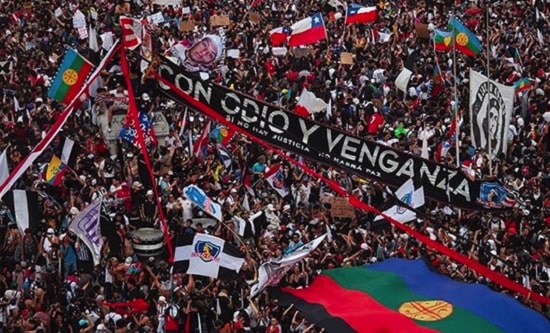
While Chilean President Sebastián Piñera’s approval ratings languish at 6%, bourgeois forces are jockeying for position in any process which leads to the establishment of the Constituent Assembly that the mass of the Chilean people are demanding. Since 14 October 2019, there have been three general strikes and weeks of demonstrations, met with repression on a scale unseen since Pinochet’s rule. Rather than fall back and accept concessions, the Chilean people are refusing to relent until Piñera resigns and their radical demands are met.
According to Chile’s National Institute of Human Rights, between 17 October 2019 and 15 January 2020, over 27 people were killed by the militarised national police, the carabineros. 10,253 people were arrested, 3,649 severely injured, 412 subjected to torture and 191 to sexual assault. 33 have lost an eye and two have been completely blinded by teargas cannisters and rubber bullets. Violations of human rights of indigenous communities continue: on 15 January carabineros evicted three Mapuche communities from an occupation that was part of a struggle to recover ancestral lands in the Araucanía region, and burned down 15 traditional homes.
The Piñera administration is pushing for even more repressive legislation. On 20 January, the Senate approved a bill which would allow the Armed Forces to be used to guard the ‘critical infrastructure’ of the country ‘in case of serious disturbance of public order or serious damage to the security of the nation’. This could pave the way for martial law.
A core demand of the protests is for a new Constitution to replace the 1980 Constitution established by former dictator Augusto Pinochet. Frantic to restore order, the government signed an ‘Agreement for Social Peace and the New Constitution’ on 15 November, pledging to hold a referendum on 26 April 2020. Two questions will be presented: do the Chilean people want to change the current Constitution and if so, do they want this to be achieved through a Constituent Assembly or a Mixed Assembly? A Constituent Assembly would be wholly made up of elected citizens, while a Mixed Assembly would be half citizens, half parliamentarians. Elections will take place in October. The Assembly will then have nine months to produce a new Constitution, a term that can only be extended once, for a maximum of three months. A referendum will then be held on the resulting document, requiring a two-thirds majority for approval.
The Mixed option is intended to re-establish bourgeois control over the movement, while the Constituent Assembly offers the possibility of more direct democracy. The Agreement has split the left-wing coalitions Frente Amplio and Nueva Mayoría: some thought it an acceptable compromise while others saw it as a trap to divert the movement into the parliamentary route and demobilise protesters. Even if a Constituent Assembly is chosen, the elections will exclude trade union officials and those under 18: organised Chilean workers and the youth are at the head of these movements.
The people have not been pacified, however, by an Agreement that holds out only the possibility but not the guarantee of a Constituent Assembly. The Agreement also ignores the demands for Piñera to go, and to raise pensions and for public control of health care, education, water, public transport and land. And so the protests continue.
Shamefully, radical leaders of the massive student uprising of 2011 have sided with the ruling class. Elected to the parliament on the basis of their record, many have proved completely opportunist. One of the most radical of the 2011 leaders, Gabriel Boric, broke with the Frente Amplio coalition in November when he signed the Agreement, plunging his libertarian socialist party Convergencia Social into a crisis. 114 members resigned in a week, and on 10 December, the Libertarian Left movement announced its departure from the party. The emerging street-level democracy showed its intolerance for opportunists when a group of protesters encountered Boric in a park and drove him away, calling him a sellout and throwing water at him.
Another leader, Giorgio Jackson, founder of the Democratic Revolution party, backed an Anti-Looting Law on 4 December. This repressive law, dressed up as protection for small businesses, bans any demonstration if it interrupts public services such as public transport and emergency services. It outlaws barricades and face masks, the blocking of traffic or the occupation of schools, universities and workplaces, with a penalty of up to five years in prison.
The massive protests have been led by a variety of social movements. Several have unified under the umbrella of Social Unity, set up in August 2019 by United Workers Central. This now encompasses more than 200 organisations and has been facilitating open councils. It ended talks with the government on 5 January. Several others have set up new parties to participate in rewriting the Constitution. One is the Party for Dignity, founded by a group of Chilean celebrities who intend it to serve as a platform for progressives to secure election to the Constituent Assembly. Its aims include ‘state … control of water, metallic and non-metallic mineral resources, marine species, salt flats, coal and hydrocarbon deposits and other fossil substances, which may not be the subject of any future concession’ and to ‘replace the system of indiscriminate exploitation of our natural resources with one that generates value, work and well-being for the population’. This has to be the basis for any democratic solution to the problems facing the mass of the Chilean people.
Sheila Rubio
Fight Racism! Fight Imperialism! No 274, February/March 2020




